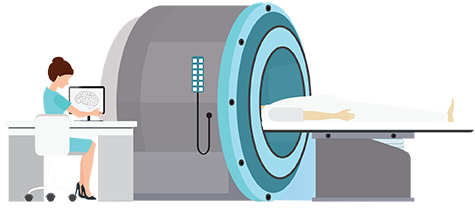

Radiation technology schools teach students how to use equipment such as X-ray machines to help doctors diagnose, monitor and treat patients. Courses vary, but according to The College Board, topics covered usually include areas like anatomy and physiology, radiographic exposure, radiographic positioning and clinical practice. In addition, radiology programs can serve as stepping stones to a surprising range of jobs. Read on to learn more about these radiology specialists, including key training and career trends.
For such a seemingly niche area of study, radiology is actually a diverse field where your title determines both what you do in the workplace and how you prepare for it. Some professionals, such as radiologists, graduate from radiology schools with advanced degrees. For others, like radiation technicians, requirements are much less steep. Here is a brief review of many different types of radiology professionals, what they do, and how they train, as reported by the Bureau of Labor Statistics (BLS).
All of the radiology professionals detailed may all work in the field of radiology, but their duties — and, in turn, training requirements — can vary tremendously. For instance, radiologic technologists and medical assistants are entry-level support professionals, meaning they can typically enter the field with an associate degree or less. The following list details common education requirements for various radiological specialties, as reported by the Bureau of Labor Statistics.
Although all of these degree programs differ in scope and duration, most build off the same basic knowledge or skill set. That means that radiologists and radiologic technicians, for instance, often take some of the same courses. Contact prospective schools directly to learn more.
Professional certifications are awarded by professional organizations rather than radiology schools and programs, and they certify a candidate’s knowledge or specialized expertise. They are typically earned in addition to any other required postsecondary certificates and degrees. Some employers prefer or require professional certification; some states also require certification in the course of licensure. Certification requirements depend on your professional specialty, as well as the organization providing the credential. Contact the certifying organization to learn more.
Job titles and education requirements are not the only things that change from one radiological specialist to the next: Career outlook and earnings vary, too. The following table offers career projections and salaries by specialty, as reported by the BLS:
| Career | Total Employment | Annual Mean Wage |
|---|---|---|
| Cardiovascular Technologists and Technicians | 56,130 | 57,250 |
| Diagnostic Medical Sonographers | 68,750 | 73,200 |
| Magnetic Resonance Imaging Technologists | 37,490 | 70,490 |
| Nuclear Medicine Technologists | 18,930 | 77,660 |
| Radiologic Technologists | 201,200 | 60,320 |
Keep in mind that other factors can influence earnings and hiring, including experience, certification and past job performance. Some professional organizations maintain employment and salary records by certification. Location also tends to be a key driver of earnings and employment demand. The right training can also give radiology professionals an edge in even the tightest job markets, so it pays to invest in your education. Contact prospective radiology and radiology technician schools to learn more about your options.